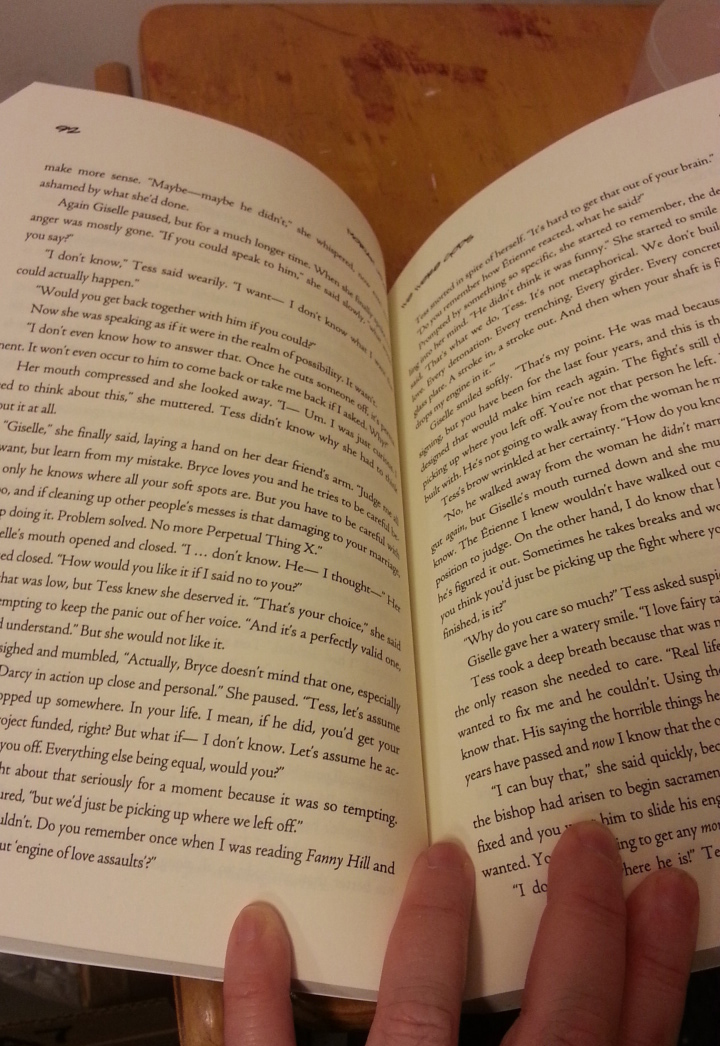 “ … maps were made by people who went first and didn’t die. The maps that survive are the ones that work.”
“ … maps were made by people who went first and didn’t die. The maps that survive are the ones that work.”
God’s Debris, Scott Adams, p 32
Never underestimate the commercial value of mental illness.

 “ … maps were made by people who went first and didn’t die. The maps that survive are the ones that work.”
“ … maps were made by people who went first and didn’t die. The maps that survive are the ones that work.”
God’s Debris, Scott Adams, p 32
 “The only thing more powerful than fear is routine.”
“The only thing more powerful than fear is routine.”
Rot & Ruin, Jonathan Maberry, p 190
 So when I was 16, I had a short-lived stint at Shoney’s as a salad bar attendant. I’ve never worked that hard in my life on a consistent basis. I didn’t do well for several reasons. Read more
So when I was 16, I had a short-lived stint at Shoney’s as a salad bar attendant. I’ve never worked that hard in my life on a consistent basis. I didn’t do well for several reasons. Read more

“Tess … ” She stopped cold at the breath of a whisper, her heart slamming into her ribs so hard she thought it would fall out right there on the table and flop around. She turned slowly—so slowly.
She opened her mouth to scream at him for ambushing her, but she realized just in time that he was as stunned as she was.
And he was beautiful. More beautiful than he had been when he was nineteen. More beautiful than he was the night he’d left her. Yet nothing about him had changed. Read more
••• TL;DR •••1
EMILIO: “Why is being a virgin when you get married so important to you?”
VICTORIA: “Because it’s not important to anybody else,” she snapped, then huffed. “No. What happened was, I saw girls in high school—and one at church—they’d have sex, almost always pressured. Sometimes it was date rape, but they didn’t have the guts to say so. Or they were confused or conflicted about it. And they’d either get pregnant or the guy would treat them like crap. Regardless of what people like to think, I’m not oblivious. I see and hear, and I remember. But I don’t care.” Read more
I read that once in a comment on a Mormon women’s writer’s blog bemoaning explicit sex in books. If I recall correctly, it was one where a bunch of the Deseret Book-published writers gather, because it was a “name” who said it. I don’t remember if my book was the one under discussion or not. Didn’t matter.
“We all know how it works.”
What struck me then and still does is that, No, we don’t all know how it works, Read more
1. ALLOW ME TO INTRODUCE MYSELF
 My story, “Allow Me to Introduce Myself,” that appeared in Monsters & Mormons has been ready for me to put up for sale for quite a while. I just haven’t gotten around to it. I hope to get that done before Christmas. Kidding. Not really. It won’t be on the Dunham site, so if you want to buy it from me (please do!) it’ll only be here, in the sidebar.
My story, “Allow Me to Introduce Myself,” that appeared in Monsters & Mormons has been ready for me to put up for sale for quite a while. I just haven’t gotten around to it. I hope to get that done before Christmas. Kidding. Not really. It won’t be on the Dunham site, so if you want to buy it from me (please do!) it’ll only be here, in the sidebar.
A Mormon nun battles demons and insecurity in the Louisiana bayou—with a baby alligator by her side and weapons powered by cold fusion. Read more
 My relationship with food is like having an abusive ex-boyfriend: He keeps coming back and coming back, every day, even though you don’t want to see him. You want to get rid of him but he won’t go away. It’s not an analogy of “I eat because I have to” and “I can’t really live without him.” It’s that you really don’t want want food in the house the way you really don’t want him to come back. That’s where the analogy stops. Read more
My relationship with food is like having an abusive ex-boyfriend: He keeps coming back and coming back, every day, even though you don’t want to see him. You want to get rid of him but he won’t go away. It’s not an analogy of “I eat because I have to” and “I can’t really live without him.” It’s that you really don’t want want food in the house the way you really don’t want him to come back. That’s where the analogy stops. Read more

They’re
just friends …
right up to the
first kiss.

Sometimes
love isn’t enough …
until it’s the only thing
you have left.
&
go on sale today!
The print books are available at Amazon, Barnes & Noble, and all the regular places.
The ebooks are available from me (see links above), Amazon, Barnes & Noble, and all the regular places (iBooks coming soon). From now until May 15, 2014, they will be priced at $1.99. After, they will be $5.99 and $4.99 respectively.
Get ’em now!
 I’m asking a question, but I’m not sure I’ll understand any responses I’ll get.
I’m asking a question, but I’m not sure I’ll understand any responses I’ll get.
A long time ago, I wrote this post: Mommy, why don’t you smile anymore?
I was doing a psych eval for clearance for a surgery I hope to have some time this coming summer, and the shrink said, “You don’t know how to relax, do you?” Why no. No, I don’t. I don’t remember the last time I had actual fun that didn’t involve guilt for being unproductive. Read more
That awkward moment when you’re a book designer and you design your own books and the print is even too small for you. (The re-do added 100 pages to it.)


You may have noticed.
I have some things on my mind I’ve wanted to discuss, but my attention span these days is pretty rotten. I’ve been tweeting (and then Facebooking) way too long to be able to put a small essay together in a coherent fashion. Read more

from May 1, 2014 – May 15, 2014
the ebooks will be $1.99 each
On May 16, 2014,
the ebooks will go to a regular price of
$5.99 and $4.99, respectively

More bullshit masquerading as inspirational quotes.
If you give up, it means you never wanted it.
I believe the person running this Tumblr is a teenager. Poor little bastard. I got suckered by that sentiment once upon a time, too.
 Tess: “You know this makes us like all the evil meddling parents in all those novels who pay off the boyfriend from the wrong side of the tracks, and then are responsible for the seething hatred between their daughter and her boyfriend until they meet up twenty years later and have angry sex.”
Tess: “You know this makes us like all the evil meddling parents in all those novels who pay off the boyfriend from the wrong side of the tracks, and then are responsible for the seething hatred between their daughter and her boyfriend until they meet up twenty years later and have angry sex.”
Étienne: “You say that like it’s a bad thing.”
Tess: “But by that time, the boyfriend has used his seething hatred to make a billion dollars just to show her father up and comes back as a master of the universe to get his revenge on the parents and his girlfriend, even though she has never stopped loving him and was heartbroken that he never tried to contact her—” Read more
“I,” Emilio said to his youngest brother, “am a manslut. That is a direct quote. Don’t be that. There will come a day—”
“A girl you like says, ‘Let’s be friends.’”
“You’ll turn forty-two and find out the woman you’re in love with thinks you’re the scum of the earth.”
The problem with exhibitionism is that sometimes people watch. —Tess LaMontagne
 I don’t like Facebook. I never did. I wouldn’t even get on it to talk to my relatives. There was always something faintly nefarious about Facebook I didn’t feel with Twitter (which may simply be better at hiding it). I also didn’t like and didn’t understand either the interface or its functionality.
I don’t like Facebook. I never did. I wouldn’t even get on it to talk to my relatives. There was always something faintly nefarious about Facebook I didn’t feel with Twitter (which may simply be better at hiding it). I also didn’t like and didn’t understand either the interface or its functionality.
But I’m an author and as authors will do (or try), we must market. And marketing was happening on Facebook. And, not coincidentally, that’s where my fans were, too. I made a page. I have a personal account, too, that’s really not so personal. So I went there and I posted there. Then Facebook changed the way it displayed what I posted, Read more
 “You’ve been smooth as a baby’s butt since you were gored three years ago,” Victoria said.
“You’ve been smooth as a baby’s butt since you were gored three years ago,” Victoria said.
“You’re supposed to be smooth,” Emilio replied, suddenly irritated. “That’s the point.”
“Yes, but! Your posture isn’t quite straight enough when it should be and your shoulders aren’t back quite far enough and you don’t lean in quite close enough to the bull. When you go down on one knee, you’re right in his blind spot. When you make the kill, you go a little too far left and you have to reach for it. Your veronicas are a little too studied, and I haven’t seen you do a mariposa in, oh, years. Your faenas are a little too cautious, the time it takes you to turn the bull a little too long, and the horns are a little too far away from your legs.” Read more
 I have been increasingly frustrated with the way Facebook has been hiding what I post from people who have requested to see what I say. For those of you who don’t know (maybe don’t even care), this is a good explanation: Getting Facebook Slapped: Understanding Facebook’s Big Lie
I have been increasingly frustrated with the way Facebook has been hiding what I post from people who have requested to see what I say. For those of you who don’t know (maybe don’t even care), this is a good explanation: Getting Facebook Slapped: Understanding Facebook’s Big Lie
Pertinent points: Read more